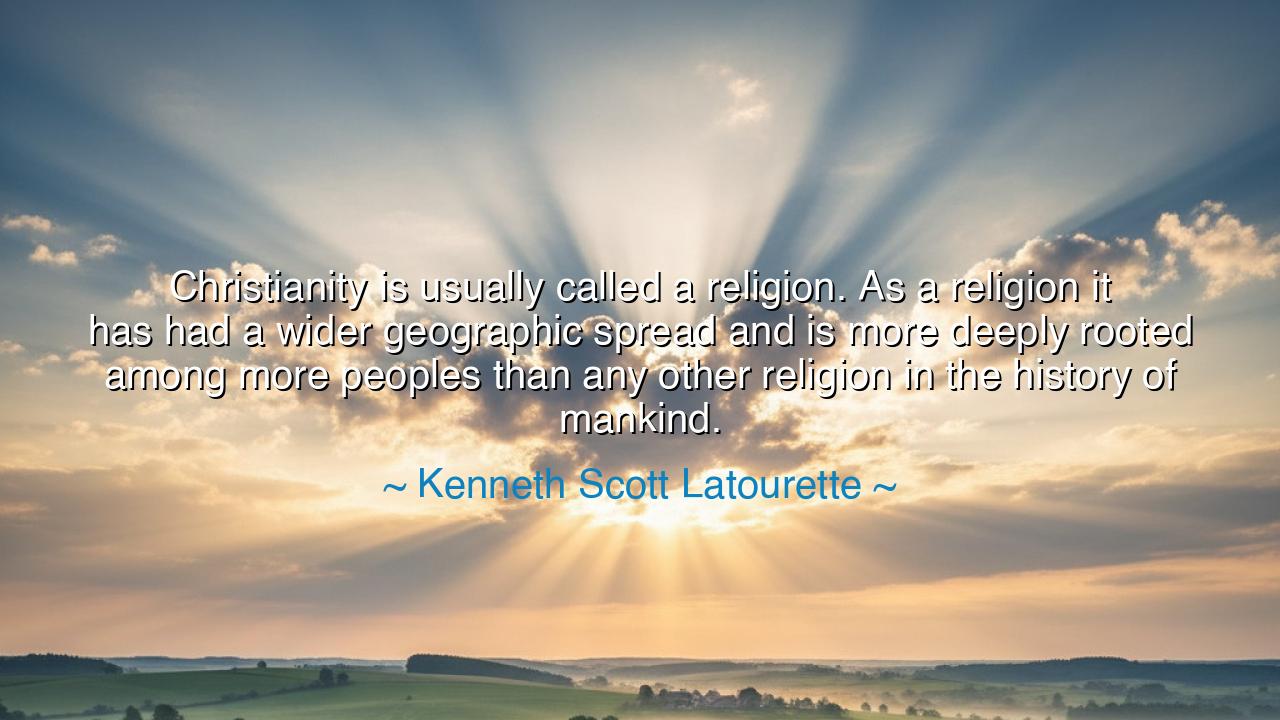
Christianity is usually called a religion. As a religion it has
Christianity is usually called a religion. As a religion it has had a wider geographic spread and is more deeply rooted among more peoples than any other religion in the history of mankind.






Kenneth Scott Latourette, the great historian of the faith, proclaimed with measured awe: “Christianity is usually called a religion. As a religion it has had a wider geographic spread and is more deeply rooted among more peoples than any other religion in the history of mankind.” In this saying, he does not merely state a fact of history; he calls attention to a phenomenon unparalleled—the reach of Christianity, from humble beginnings in the villages of Galilee to the farthest corners of the earth. It is a river that has flowed across continents and centuries, carrying with it both triumphs of compassion and struggles of human frailty.
The ancients marveled at the mystery of this spread. For the faith began not in the palaces of emperors, but among fishermen, tax collectors, and outcasts. The founder was not a conqueror but a teacher who spoke of love, forgiveness, and a kingdom not of this world. And yet, within three centuries, Christianity had conquered Rome—not by sword, but by steadfast witness, by the courage of martyrs, by the unyielding conviction that love is stronger than death. Latourette’s words remind us that no other religion in human history has planted itself so widely, in the soil of so many nations, among so many tongues and peoples.
Consider the story of Saint Patrick, who carried the faith into the wilds of Ireland in the fifth century. He was not sent as a general with armies, but as a missionary with words of peace. Through him, a people once bound to druids and tribal gods embraced a new vision, and Ireland became a land of monasteries, learning, and light that preserved culture through the darkness of Europe’s Middle Ages. This is but one thread in the tapestry Latourette speaks of: Christianity’s ability to take root in strange soil, adapting to new cultures while retaining its heart.
Or recall Matteo Ricci, the Jesuit who in the sixteenth century entered China, clothing himself in the robes of a Confucian scholar. He sought not to destroy the wisdom of the East, but to build bridges, to show how the gospel could walk alongside philosophy and art. Though his mission faced resistance, his story reveals the deeper truth of Latourette’s claim: Christianity’s spread has often been carried not by force alone, but by minds and hearts willing to meet others with respect, persuasion, and sacrifice.
And yet, to speak honestly, this spread has also been marked by shadows. Colonization often carried Christianity upon its ships, and at times, the faith was used to justify conquest and oppression. But even in these dark chapters, the seed of the faith often outlived the empire that bore it. Peoples across Africa, Asia, and the Americas have made Christianity their own, weaving it into their cultures, languages, and songs. This is part of its unmatched rootedness: it is not merely imposed, but embraced, reshaped, and sung anew by countless nations.
The meaning of Latourette’s words is thus twofold: first, that Christianity is historically unique in its reach; second, that this reach reveals something about the universality of its message. A gospel born in one land found home in every land. A message spoken in one tongue now prays in every tongue. No other religion has been so widely embraced, and no other has been so deeply planted across such diverse peoples.
The lesson is this: if a message can cross seas, mountains, and centuries, then it carries something essential to the human spirit. Whether one believes or not, the story of Christianity teaches that truth, hope, and compassion can be more powerful than armies and empires. And so, each of us must ask: what message do we carry into the world? Is it one that divides, or one that unites? One that dies with us, or one that takes root and grows beyond us?
Practical actions follow. Learn from the example of the faith’s spread: live with courage, that your convictions might endure; live with humility, that your words may cross cultures; live with compassion, that your message may be embraced by strangers. For as Latourette reminds us, the greatest forces in history are not only steel and fire, but ideas and faith that live in the hearts of many peoples.
O seeker, remember this: Christianity’s reach across the world is not just a tale of numbers, but a testimony to the power of a message that touched the deepest chords of humanity. Let this truth inspire you to carry your own message—of love, of truth, of justice—beyond the narrow borders of self, until it too takes root and lives among many.






AAdministratorAdministrator
Welcome, honored guests. Please leave a comment, we will respond soon